Living Well with Multiple Sclerosis
Welcome to Living Well with MS, the podcast from the Overcoming MS charity. In each episode, your host Geoff Allix explores a different aspect of the Overcoming MS Program in greater depth by talking with experts and people with MS about health lifestyle changes. New episodes are published on Wednesdays and feature interviews with scientists, neurologists, fitness specialists, diet experts, stress reduction professionals. The podcast also features inspirational, real-life stories from people with multiple sclerosis following the Overcoming MS program, about the challenges and victories of managing symptoms through lifestyle modification.
Episodes
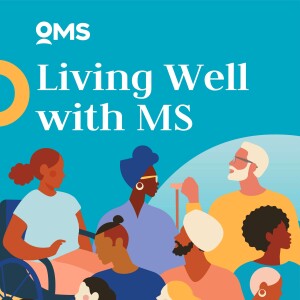
Wednesday Sep 20, 2023
Wednesday Sep 20, 2023
Welcome to Living Well with MS. In this episode, we are pleased to welcome Mike Kennedy as our guest. Mike was diagnosed with MS over 10 years ago and is an advocate for living a healthy life and following the Overcoming MS Program. He will be discussing with Geoff the lessons he has learnt along the way, including when he deviated from the Overcoming MS diet. Keep reading for the key episode takeaways. Questions and Timestamps: 00:33 Could you introduce yourself? 02:32 Can you tell us about your MS and Overcoming MS journey? 11:21 Unhealthy vegan food 18:25 Experience with first neurologist 21:42 Cryotherapy or cold exposure 25:26 Hyperbaric oxygen therapy 29:50 Homeopathy 33:15 The placebo effect 38:31 Family prevention 43:44 Tea and plant-based milks 45:38 Matt Embry’s influence 49:28 What advice would you give to someone newly diagnosed? Selected Key Takeaways: Change your life for life15:01 “If I was told right now, ‘Mike, you no longer have MS, you will not [get] it again', I would not go back to eating cheese. I would not go back to eating dairy. I would not go back to eating big fat burgers. Honestly, I think that it's all habitual because these are the habits that I built around my life.” Cryotherapy and hyperbaric oxygen therapy helped Mike’s inflammation. 23:13 “At the 10-year mark, my symptoms at that time were a little more pronounced. I tried hyperbaric oxygen [therapy] for an hour and then cryotherapy. I can only say it was the most incredible relief or feeling I've [ever] experienced. [When] I got out of the cryotherapy tank, I felt like I could run a marathon, and I have never run a marathon. All the inflammation in my legs [was] gone; it was just like fresh blood came into my legs and it was the most incredible feeling. I recommend anyone with problems with inflammation or MS to try cryotherapy.” There can be a silver lining to an MS diagnosis53:40 “Believe me, it's not all bad news. There's so much you can do to make this situation much better for yourself. In fact, in so many ways, I'm a lot healthier now than I would have been had I not had MS. I know that sounds pretty strange, but it's true. I got healthier; my weight’s a lot healthier. I'm not saying I wouldn't wish I didn't have it, but it certainly gives me a lot of positives as well as negatives, without doubt.” Want to learn more about living a full and happy life with multiple sclerosis? Sign up to our newsletter to hear our latest tips. More info and links: Connect with Mike on Twitter @mrmikekennedy or Instagram @miketonykennedy Watch the BBC programme 'Ultraprocessed Foods: A recipe for ill health?' Visit Conor Devine’s MS site Watch 'The Placebo Experiment: Can My Brain Cure My Body?' by Dr Michael Mosley Listen to Trevor Wicken's podcast episode MS Workouts with Overcoming MS Listen to Dr Gretchen Hawley's podcast episodes: Season 2 episode 18 Season 3 episode 39 Listen to Dom Thorpe's podcast episode Listen to Matt Embry's podcast episode Find out more about Mike’s mum’s charity, ‘Ladies Fighting Breast Cancer’ New to Overcoming MS? Visit our introductory page Connect with others following Overcoming MS on the Live Well Hub Visit the Overcoming MS website Follow us on social media: Facebook Instagram YouTube Pinterest Don’t miss out: Subscribe to this podcast and never miss an episode. Listen to our archive of Living Well with MS episodes here. If you like Living Well with MS, please leave a 5-star review. Feel free to share your comments and suggestions for future guests and episode topics by emailing podcast@overcomingms.org. Make sure you sign up to our newsletter to hear our latest tips and news about living a full and happy life with MS. Support us: If you enjoy this podcast and want to support the ongoing work of Overcoming MS, we would really appreciate it if you could leave a donation here. Every donation, however small, helps us to share the podcast with more people on how to live well with MS.
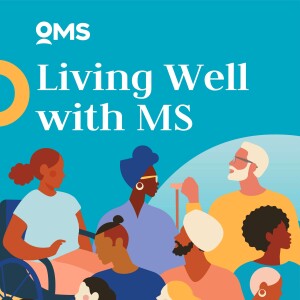
Wednesday Sep 13, 2023
Wednesday Sep 13, 2023
Welcome to Living Well with MS. In this episode, we are pleased to welcome Overcoming MS Ambassador Kristi Peak-Oliveira, who has been following the Overcoming MS Program since 2016 and is an Ambassador for the Boston Circle. She is also a pathologist and the assistant director for assistive technology services at ‘Easterseals Massachusetts’, whose clients include people with multiple sclerosis. Watch this episode on YouTube here. Keep reading for the key episode takeaways and Kristi's bio. Questions and Timestamps 01:00 Could you tell us a bit about yourself and your MS diagnosis? 05:08 How did you come across Overcoming MS? 07:14 Tell us about how you became the Ambassador for the Boston Circle. 11:44 Have you talked to your neurologist about Overcoming MS? 18:28 You work as a speech pathologist and as the assistant director for assistive technology services at ‘Easterseals Massachusetts’. Could you tell us what that is? 21:08 What are some examples of assistive technology that can help symptoms like cog fog and memory issues? 24:54 Do you have examples of assistive technology for fine motor control as well? 26:13 Is there anything we can do ourselves to make our devices more accessible? 26:59 Can you tell us about your upcoming trip to Peru, to take assistive technology to orphan children with disabilities? 31:39 You have always loved dancing, are you still able to dance with your MS symptoms? 35:41 What advice would you offer to someone who has been newly diagnosed with MS? Selected Key Takeaways Assistive technology helps people complete daily tasks more independently. 18:45 “Assistive technology is a broad category, but it's basically almost anything that can compensate for your disabilities to help you access different life skills, whether it's working on a computer, cleaning your house, or remembering to take your medication. Augmentative communication is what I do as a speech pathologist, [and] is a subset of assistive technology. It focuses on someone who is not able to use speech as their primary means of communication. So, we're helping them with technology.” Kristi credits the Overcoming MS Program for giving her the confidence to take a humanitarian trip to Peru. 30:32 “My yoga teacher got this idea; it's called ‘Project Give a Voice’. I'm going with her in September for two weeks to bring augmentative communication to students in Peru who are not able to speak. I'm really excited about it [and] she's excited about it [too]. It's because of Overcoming MS. If it wasn't for Overcoming MS, I might not ever have tried yoga or ended up with this teacher. [Following] Overcoming MS gives me the confidence to know that I'm going to physically be able to participate in this trip.” Finding a reason to live well helps Kristi stay motivated. 32:58 “You have to find something that's really motivating. For me, it was my dance class. I didn't want to give up my dance class, I love the women there. That was the thing that really motivated me to dig into Overcoming MS. Over time, foot drop was an issue [and] I've definitely fallen in the class. But over time, I've definitely noticed especially my right foot, (my right side is more affected) has gained in strength.” Want to learn more about living a full and happy life with multiple sclerosis? Sign up to our newsletter to hear our latest tips. More info and links: Learn more about Project Give a Voice Easterseals Massachusetts Home Page Easterseals Massachusetts assistive technology page Read a guide for doctors and other healthcare workers when speaking with patients about assistive technology and MS. It was written by a speech-language pathologist who works at a nursing home dedicated to people with progressive neurological diseases whom Kristi knows professionally. Listen to the episodes Vickie the Ambassador from Connecticut was on: Coffee Break Building Community through Overcoming MS Circles New to Overcoming MS? Visit our introductory page Connect with others following Overcoming MS on the Live Well Hub Visit the Overcoming MS website Follow us on social media: Facebook Instagram YouTube Pinterest Don’t miss out: Subscribe to this podcast and never miss an episode. Listen to our archive of Living Well with MS episodes here. If you like Living Well with MS, please leave a 5-star review. Feel free to share your comments and suggestions for future guests and episode topics by emailing podcast@overcomingms.org. Make sure you sign up to our newsletter to hear our latest tips and news about living a full and happy life with MS. Support us: If you enjoy this podcast and want to support the ongoing work of Overcoming MS, we would really appreciate it if you could leave a donation here. Every donation, however small, helps us to share the podcast with more people on how to live well with MS. Kristi’s bio: Kristi’s MS and Overcoming MS journey Kristi was diagnosed with MS in July of 2016 and started following the Overcoming MS program later that year. She has been a part of the Boston, US Circle since it began and now serves as the Ambassador. Kristi’s personal life Kristi is married with two adult children, and thanks to Overcoming MS continues to enjoy activities such as yoga, dance class, gardening, and singing in her church choir. Kristi’s career Kristi has been a speech-language pathologist for over 30 years and currently serves as assistant director of assistive technology services at Easterseals Massachusetts, a not-for-profit organisation dedicated to serving the needs of individuals with disabilities. Clients include those with multiple sclerosis, and they are provided with assistive technology (AT) solutions to compensate for sensory, physical and cognitive challenges. Kristi has used AT solutions herself to deal with MS symptoms and exacerbations and is happy to share the information so others with MS can benefit.
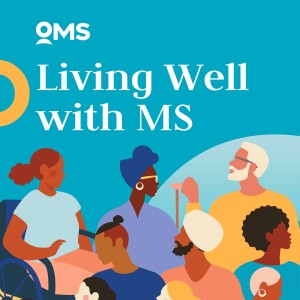
Wednesday Sep 06, 2023
Wednesday Sep 06, 2023
Welcome to Living Well with MS, where we are pleased to welcome Professor Richard Burt as our guest! Professor Burt is a leading expert in hematopoietic stem cell transplantation (HSCT) for autoimmune diseases including MS and has been awarded a number of prestigious accolades. Watch this episode on YouTube here. Keep reading for the key episode takeaways and Professor Burt’s bio. Questions and Timestamps 02:35 Could you introduce yourself and tell us about your work with patients with autoimmune conditions and MS? 12:03 What do you think about the idea of flipping the model and offering the most aggressive treatment options to patients first? 16:27 What are the risks of HSCT? 21:18 Can you tell us about the costs associated with stem cell transplantation? 24:13 What type of patients respond best to HSCT? 31:16 Do you see a future where doctors are trained in multiple fields and understand the whole picture of autoimmunity? 38:10 If someone’s interested in exploring HSCT, what should they look for in a clinic or physician? 41:47 HSCT has a high upfront cost but how does that compare to being on an MS drug for years or perhaps a lifetime? 53:50 The Dalai Lama wrote the introduction to your book 'Everyday Miracles'. How did that come about? Selected Key Takeaways Randomised controlled trial results for HSCT have been very positive 05:12 “In a randomised trial, [HSCT] was just hands down much better than any [other] drug. All the drugs you use for MS are based on approval for slowing disease activity. That is slowing the number of relapses or slowing the rate of progression of disability but not stopping it or not reversing it. Often you stay on these drugs indefinitely. A transplant, on the other hand, is a one-time treatment and afterwards, you get better, your neurologic disability reverses, nothing else had done that.” It’s important to consider the disease trajectory, risks, and benefits of stem cell transplants. 14:02 “MS causes accelerated loss of brain volume, that is brain atrophy. Unfortunately, as we age, we get brain atrophy and a normal, very low, but normal decline. But once you get MS, that decline takes a much sharper drop, and you're losing neural function a lot faster than normal ageing. For some reason, that's not viewed as a sub-acute or semi-emergency situation that you want to reverse. Traditional drugs have mostly just slowed that rate of decline, but it's still faster than what happens with normal ageing. I would think a more aggressive approach up front would be wise, but you always have to remember [the] risk–benefit. If we could do a stem cell transplant with zero risk of mortality, I would say absolutely for everybody. But you can't do that right now.” A medical speciality and institute for autoimmunology could help push the field forward34:20 “There are 80 different autoimmune diseases that I can think of offhand. They're all “homeless” in different departments like Crohn's disease [which is] in gastroenterology, Scleroderma [which] is in rheumatology, and multiple sclerosis [which] is in neurology. They're all separated [into] different areas. If there was a better organisation, beginning at a federal level with a national institute of autoimmune diseases that supports centres of excellence around the country, that would really help this go forward.” Want to learn more about living a full and happy life with multiple sclerosis? Sign up to our newsletter to hear our latest tips. More info and links: Visit Professor Burt’s website Read Professor Burt’s new book on HSCT for autoimmune diseases ‘Everyday Miracles’ Check out Professor Burt’s medical textbook ‘Hematopoietic Stem Cell Transplantation and Cellular Therapies for Autoimmune Diseases’ Find out more about the StarMS trial in the UK New to Overcoming MS? Visit our introductory page Connect with others following Overcoming MS on the Live Well Hub Visit the Overcoming MS website Follow us on social media: Facebook Instagram YouTube Pinterest Don’t miss out: Subscribe to this podcast and never miss an episode. Listen to our archive of Living Well with MS episodes here. If you like Living Well with MS, please leave a 5-star review. Feel free to share your comments and suggestions for future guests and episode topics by emailing podcast@overcomingms.org. Make sure you sign up to our newsletter to hear our latest tips and news about living a full and happy life with MS. Support us: If you enjoy this podcast and want to support the ongoing work of Overcoming MS, we would really appreciate it if you could leave a donation here. Every donation, however small, helps us to share the podcast with more people on how to live well with MS. Professor Richard Burt’s bio: Professor Richard Burt is a Fulbright Scholar, Professor of Medicine at Scripps Health Care, tenured retired Professor of Medicine at Northwestern University, and CEO of Genani Biotechnology. He endeavored for 35 years, first with animal models and then with some of the world’s first clinical trials, to bring the field of stem cell and cellular therapy to the patients’ bedsides. Publishing Professor Burt has published more than 145 first-author articles and is the editor of four medical textbooks. He was the first Autoimmune Committee Chairperson for the International Bone Marrow Transplant Registry (IBMTR) and was the principal investigator of a National Institutes of Health (NIH) $10 million multicenter contract to develop stem cell clinical trials for autoimmune diseases. Hematopoietic stem cell transplants Professor Burt performed America’s first hematopoietic stem cell transplant (HSCT) for multiple sclerosis (MS), systemic lupus erythematosus (SLE), Crohn’s disease (CD), stiff person syndrome (SPS), and chronic inflammatory demyelinating polyneuropathy (CIDP) and published the world’s first randomised clinical stem cell transplantation trials for systemic sclerosis and multiple sclerosis. Awards and achievements He has been awarded the Leukemia Scholar of America, the Lupus Foundation of America Fidelitas Award, the van Bekkum Award by the European Society for Blood and Marrow Transplantation, the Distinguished Clinical Achievement Award by the Clinical Research Forum, and the European Group for Blood and Marrow Transplantation Clinical Achievement Award. Professor Burt was presented in Vatican City, Rome, with the “Keys to the Vatican,” was a speaker at the Festival of Thinkers in Leadership in Healthcare in the United Arab Emirates and chaired the biotechnology session at the Baku Azerbaijan International Humanitarian Forum. Professor Burt was recognised by Science Illustrated for accomplishing one of the top 10 medical breakthroughs for the next 10 years and by Scientific American as one of the top 50 individuals for improving humanity and outstanding leadership.
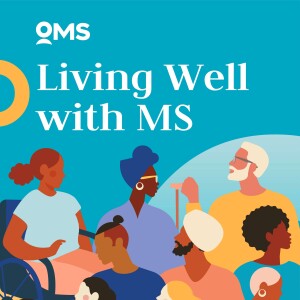
Wednesday Aug 30, 2023
Wednesday Aug 30, 2023
In this episode of Living Well with MS, Overcoming MS Medical Advisor Dr Jonathan White, who is an Obstetrician and Gynaecologist, welcomes Neurologist, Dr Kate Petheram, and Gynaecologist and Menopause specialist, Dr Siobhan Kirk for a round-table discussion on multiple sclerosis and menopause. Watch this episode on YouTube here. Keep reading for the key episode takeaways. Questions and Timestamps: 00:34 The importance of talking about menopause and MS. 01:33 What is menopause? 04:48 What do we know about the effect of menopause on MS? 07:12 What are the symptoms somebody may experience with menopause, that a gynaecologist can help with? 08:47 What is hormone replacement therapy (HRT)? 10:17 Is HRT safe to take with disease-modifying therapies for MS? 12:31 Can blood tests diagnose menopause? 15:02 Is HRT safe for someone who has a family history of breast cancer? 16:33 Does HRT cause people to put on weight? 19:01 Should someone start HRT because they have MS? 21:58 Will supplements or dietary changes help menopause symptoms? 23:14 What about this concept of bioidentical HRT? 24:19 Do you think somebody with MS would benefit from testosterone patches? 26:40 What's the latest research we know about the impact on hormones and menopause treatment, and the outcomes? 28:15 Are hot flushes and heat sensitivity a concern for people with MS? 29:49 What is the Mirena coil and how that may be a part of HRT? 32:23 What are the side effects of progestogen? 32:55 Does early menopause (before 40) affect the rate of progression of someone's MS, either for the better or for worse? 39:26 Topical oestrogen and bladder symptoms Selected Key Takeaways: There is a lot of overlap between MS symptoms and menopause symptoms.6:42 Dr Kate Petheram: “Because of the overlap in symptoms. There are perhaps elements which are so relevant to menopause, which we can perhaps talk about as well in terms of symptoms such as hot flushes and heat intolerance, which again may exacerbate symptoms of MS. So, there may not be a biological difference, but the symptoms of menopause and perimenopause may influence and make worse MS symptoms, which is why I believe it's so important to recognise and point women in the right direction to get the right help." There is no evidence that Hormone Replacement Therapy (HRT) causes cancer.15:19 Dr Siobhan Kirk: “There is no evidence that HRT causes breast cancer. But if you're taking extra hormones, and you've got abnormal cells, then the extra hormones can promote the growth of the abnormal cells. There's no increased risk of breast cancer with use of HRT under the age of 50, for earlier menopause, because you're just replacing what the uterus should be producing.” There is a lot of research taking place around the world on different aspects of living with MS including menopause. 34:12 Dr Jonathan White: “It is reassuring [for] someone living with MS to know that there is just a colossal amount of research going on around the world on all sorts of aspects of living with MS. I feel like reproductive health and women's health is getting to that place slowly. There's a really big push, I can see that in the research community and I'm glad to hear that menopause and post-reproductive health is getting it too.” Want to learn more about living a full and happy life with multiple sclerosis? Sign up to our newsletter to hear our latest tips. More info and links: Watch the YouTube video Find out more about Women’s Health Concern Visit The British Menopause Society Read more about menopause and MS here New to Overcoming MS? Visit our introductory page Connect with others following Overcoming MS on the Live Well Hub Visit the Overcoming MS website Follow us on social media: Facebook Instagram YouTube Pinterest Don’t miss out: Subscribe to this podcast and never miss an episode. Listen to our archive of Living Well with MS here. If you like Living Well with MS, please leave a 5-star review. Feel free to share your comments and suggestions for future guests and episode topics by emailing podcast@overcomingms.org. Make sure you sign up to our newsletter to hear our latest tips and news about living a full and happy life with MS. If you enjoy this podcast and want to support the ongoing work of Overcoming MS, you can leave a donation here. Bios: Dr Siobhan Kirk’s Bio:Dr Siobhan Kirk is an Associate Specialist in Gynaecology and Clinical Lead for Sexual & Reproductive Health in Belfast HSC Trust.Siobhan’s careerShe is a Fellow of both the Royal College of Obstetricians & Gynaecologists and the Faculty of Sexual & Reproductive Healthcare. She is a British Menopause Society accredited menopause specialist and trainer, based in the menopause clinic in the Mater Hospital, Belfast. She is passionate about all aspects of women’s health, is on NI RCOG and FSRH committees, and is involved in undergraduate and postgraduate teaching. Dr Kate Petheram’s Bio: Dr Kate Petheram is a Consultant Neurologist in Sunderland where she is currently MS lead. Kate’s career backgroundKate studied medicine in Bristol and stayed in the southwest to do her medical training in Bristol and Exeter moving to London to do Neurology jobs at St Georges and The Royal Free. She made the move to the North East to undertake Neurology specialist training. She is a local PI for a number of observational studies. She is a member of the ABN quality committee and one of the medical advisors for the MS Society. She has recently been appointed as training programme director for the North East. Dr Jonathan White’s Bio: Jonathan’s Career: Dr Jonathan White went to the University of Glasgow Medical School, graduating in 2008 (MBChB). He completed a further five years of training in Obstetrics and Gynecology and is a member of the Royal College of Obstetricians & Gynecologists (MRCOG). He works at the Causeway Hospital, Coleraine and has a special interest in early pregnancy and recurrent pregnancy loss. In April 2022, Jonathan was awarded “Doctor of the Year” at the inaugural Northern Ireland Health and Social Care Awards. He contributed to the ‘Overcoming Multiple Sclerosis Handbook: Roadmap to Good Health’ by writing the chapter about medication. Overcoming MS and personal life: Jonathan was diagnosed with RRMS in October 2015 and has been following the Overcoming MS Program ever since. Dr White assists Overcoming MS as a medical advisor and event facilitator. He lives on the North Coast of Northern Ireland, is married to Jenny and father to Angus and Struan. His interests include the great outdoors, cycling and running (reluctantly), reading, rugby, film, and spending time with his family.
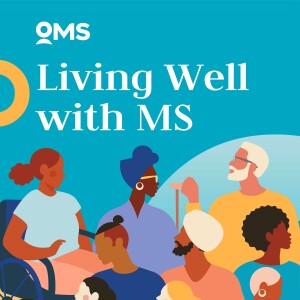
Wednesday Aug 09, 2023
Wednesday Aug 09, 2023
Welcome to Living Well with MS, where we are pleased to welcome Shannon Harvey as our guest! Shannon is an Australian journalist and filmmaker specialising in wellness, mental health, and optimising wellbeing for those with chronic conditions. Watch this episode on YouTube here. Keep reading for the key episode takeaways and Shannon’s bio. Questions and Timestamps: 03:17 Can you tell us about your film ‘The Connection: Mind Your Body’? 05:22 In your film ‘The Connection’ you interview some of the top scholars on mindfulness and the mind-body connection including Jon Kabat-Zinn and Dr. Herbert Benson. Can you tell us a bit about their work and what you learned from them? 08:05 You mentioned that for your project ‘My Year of Living Mindfully’ (both a film and book) you tried out the science on yourself. How did that go? 10:01 Is there a big difference between doing mindfulness rigorously every day and doing it three or four times a week? 11:21 You've also written a book, ‘The Whole Health Life’, and have interviewed dozens of scientists and patients about living a healthy life with an autoimmune disease. So, what are the takeaways from writing that? 12:55 You count Professor George Jelinek as a personal hero of yours. Could you tell us about what it was like to meet George? 15:44 Could you tell us about your latest project called ‘What if mental illness was preventable’? 18:38 How can listeners find out more about your work and watch your films? Key Takeaways: Making lifelong changes is hard but worth it. 12:19 “‘The Whole Health Life’ is broken up into very practical things that the Overcoming MS community is already [doing]. Things like making sure I regularly exercise, get enough sleep, have meaningful connections with the people that I love, and [how to] nurture those relationships. Then, [it] talks about the fact that making these lifelong changes is really, really hard. The book is also about how we can apply the science of behaviour change to actually make [these] changes [so] that we can actually stick to [them].” Professor George Jelinek shows that people can live well with chronic conditions. 13:04 “I met George (Jelinek) when I was first shooting ‘The Connection’. It was very much the beginning of my understanding of the many things that we can do for ourselves in order to live well with a chronic illness. He blew me away the first time I met him, because he was really well, despite everything. Despite his family history, despite his prognosis, he was just so well, and meeting him was quite inspirational because I thought to myself, ‘well, if, if he can do it, then he's like a living case study for me to show that I can do it, too.’” Shannon’s next project asks, “What if mental illness was preventable?” 16:53 “While I was making ‘My Year of Living Mindfully’, I learned that so much of mental illness actually begins before the age of 20 or 22, I think it is. If you develop a mental illness at a young age, you are significantly more likely to develop it again later in life. If you've developed it a second time, it greatly increases your chances of developing it a third time. So, I'm really personally interested in this idea of prevention.” Want to learn more about living a full and happy life with multiple sclerosis? Sign up to our newsletter to hear our latest tips. More info and links: Find out more about Shannon’s work Find out more about ‘The Connection’ Find out more about ‘My Year of Living Mindfully’ Jon Kabat-Zinn and Mindfulness-Based Stress Reduction Find out more about Dr. Herbert Benson Read about George Jelinek’s personal story Listen to S5E13 Meditation tips with Professor Craig Hassed Visit the Overcoming MS Mental Health Hub New to Overcoming MS? Visit our introductory page Connect with others following Overcoming MS on the Live Well Hub Visit the Overcoming MS website Follow us on social media: Facebook Instagram YouTube Pinterest Don’t miss out: Subscribe to this podcast and never miss an episode. Listen to our archive of Living Well with MS episodes here. If you like Living Well with MS, please leave a 5-star review. Feel free to share your comments and suggestions for future guests and episode topics by emailing podcast@overcomingms.org. Make sure you sign up to our newsletter to hear our latest tips and news about living a full and happy life with MS. Support us: If you enjoy this podcast and want to support the ongoing work of Overcoming MS, we would really appreciate it if you could leave a donation here. Every donation, however small, helps us to share the podcast with more people on how to live well with MS. Shannon’s bio: Shannon Harvey is the multi-award-winning director of two internationally acclaimed documentaries, The Connection: Mind Your Body and My Year of Living Mindfully. She’s currently working on a new film project while balancing her life as the mother of two adventurous boys. Shannon’s career background Shannon was the recipient of the National Press Club of Australia’s “Health Journalist of The Year” award for her first book, The Whole Health Life, which is about finding good health after being diagnosed with an autoimmune disease. Shannon has worked as a news and current affairs journalist for leading news organisations such as ABC, Nine Network and Fairfax and her latest book, My Year of Living Mindfully is published by Hachette.
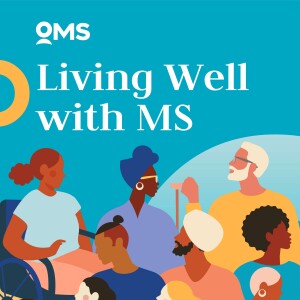
Wednesday Aug 02, 2023
Wednesday Aug 02, 2023
In this episode, we are sharing the highlights from our webinar 'Women’s Health' with Dr. Jonathan White and Professor Helen Reese Leahy. Dr. Jonathan White is an Obstetrician and Gynecologist, and the Overcoming MS Medical Advisor. Helen lives with primary progressive MS and follows the Overcoming MS Program. They discuss how MS impacts women’s health and how the Overcoming MS Program can best support women’s health. This webinar was recorded as part of our Finding Hope with Overcoming MS webinar series. You can watch the whole webinar here or the podcast highlights on YouTube here. Keep reading for the key episode takeaways and bio information. Topics and Timestamps 00:56 The history of MS research with women (Helen) 08:15 Reproductive health and MS (Jonathan) 26:14 The Overcoming MS Program supports every aspect of women’s health (Helen) 34:51 Hormone replacement therapy (HRT) (Jonathan) 47:41 Bladder issues with MS and menopause (Jonathan and Helen) Selected Key Takeaways More research is needed to understand menopause’s effect on MS "The age group with the highest number of people with MS, both men and women, is now 55-64. So, if you think about [that] within the general MS population, that's obviously a very large number of women who are either menopausal or postmenopausal. But very, very few women over 50 are recruited for MS research trials. So, the effects of menopause on the lives and health of women with MS, in general, but also our response to DMTs, are very under-researched.” Inflammation can worsen as we age "‘Inflammageing’ is a fascinating term, which essentially [means] the inflamed pro-inflammatory state that people exhibit as they get older. A lot of the conditions we develop at an older age are actually due to increases in inflammation. Cardiovascular disease would be a prime example of that. We think that ‘Inflammageing’ certainly has a role in this mixed bag of MS and menopause, and of course, the obvious one to look at will be oestrogen deficiency. Is HRT beneficial if you have MS? There is some evidence to say that it is. But again, none of those studies are prospective or randomised control studies. Generally speaking, it's not recommended to take HRT just by virtue of having MS to protect yourself. But there's certainly no reason not to [take it] because you have MS [and menopause] and in fact, it may be beneficial. So, if you are struggling with the hot flushes, the night sweats or your urinary symptoms have suddenly got much worse, you're suffering from vaginal dryness, then this is definitely a conversation that you should be having." Bladder issues are common with MS and menopause "With MS in both males and females, we think up to between 50% and 70% of people will have bladder dysfunction due to MS. That usually affects the nerves supplying the muscle, the detrusor muscle in the bladder wall, and makes it very irritable, so it tends to be an overactive or urge problem with MS. That's also very common post-menopause, and the mechanism isn't entirely the same, but it does share a bit, and part of it is certainly to do with oestrogen deficiency." More Info and Links: Watch the original webinar Listen to Dr. Jonathan White’s podcast episodes on Season 1 Episode 2, Season 2 Episode 19, Season 3 Episode 32, the 100th Episode, and Season 4 Episode 64 Read the paper‘Effects of Menopause in Women with Multiple Sclerosis: An Evidence-Based Review’ Read ‘Does menopause influence the course of MS?’ Visit the Royal College of Obstetricians, Gynecologists’ women's health hub The British Menopause Society The Women’s Health Concern Listen to Dr. Rachael Hunter discuss the 3Ps on S4E67 Listen to Helen’s podcast episode about Primary Progressive MS New to Overcoming MS? Visit our introductory page Connect with others following Overcoming MS on the Live Well Hub Visit the Overcoming MS website Follow us on social media: Facebook https://www.facebook.com/OvercomingMS/ Instagram https://www.instagram.com/overcomingms/ YouTube https://www.youtube.com/overcomingms Pinterest https://www.pinterest.com/overcomingms/ Website https://overcomingms.org/ Don’t miss out: Subscribe to this podcast and never miss an episode. Listen to our archive of Living Well with MS episodes here. If you like Living Well with MS, please leave a 5-star review. Feel free to share your comments and suggestions for future guests and episode topics by emailing podcast@overcomingms.org. Make sure you sign up to our newsletter to hear our latest tips and news about living a full and happy life with MS. Support us: If you enjoy this podcast and want to support the ongoing work of Overcoming MS, we would really appreciate it if you could leave a donation here. Every donation, however small, helps us to share the podcast with more people on how to live well with MS. Dr. Jonathan White’s Bio Career: Jonathan went to the University of Glasgow Medical School, graduating in 2008 (MBChB). He completed a further five years of training in Obstetrics and Gynecology and is a member of the Royal College of Obstetricians & Gynecologists (MRCOG). He works at the Causeway Hospital, Coleraine and has a special interest in early pregnancy and recurrent pregnancy loss. In April 2022, Jonathan was awarded “Doctor of the Year” at the inaugural Northern Ireland Health and Social Care Awards. He contributed to the ‘Overcoming Multiple Sclerosis Handbook: Roadmap to Good Health’, by writing the chapter about medication. Overcoming MS and personal life: Jonathan was diagnosed with RRMS in October 2015 and has been following the Overcoming MS Program ever since. Dr. White assists Overcoming MS as a medical advisor and event facilitator. He lives on the North Coast of Northern Ireland, is married to Jenny and father to Angus and Struan. His interests include the great outdoors, cycling and running (reluctantly), reading, rugby, film and spending time with his family. Professor Helen Rees Leahy’s bio: MS and Overcoming MS Helen was diagnosed with Primary Progressive MS in 1997 when she was 37 years old. Being ineligible for any Disease Modifying Treatment (DMT) within the UK National Health Service, she began to explore holistic approaches to managing her condition. She discovered Overcoming MS in 2008 and has followed the Program ever since. She was previously a Trustee for Overcoming MS. Personal life and career Helen lives in Conwy, a small, medieval town in North Wales. In 2017, she took medical retirement from the University of Manchester where she was a Professor in the Department of Art History and Cultural Practice. As an Emerita Professor, Helen continues to research and teach doctoral students. She also spends time hand-weaving and learning Welsh, the language of her ancestors.
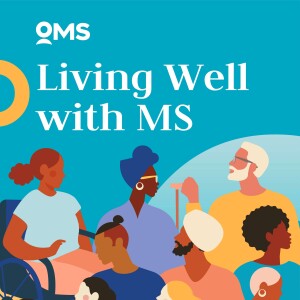
Wednesday Jul 26, 2023
Wednesday Jul 26, 2023
Welcome to Living Well with MS, where we are delighted to welcome MS Nurse, Phil King, as our guest! Phil offers a great perspective: as a Multiple Sclerosis nurse who also has MS himself, he has been following the Overcoming MS Program for more than a decade. Watch this episode on YouTube here. Keep reading for the key episode takeaways and Phil’s bio. Questions and Timestamps 00:54 Can you tell us about your personal MS journey and professional MS journey? 05:35 Did you become an MS nurse before or after your diagnosis? 11:36 Do you recommend Overcoming MS to your patients? 17:09 Would you say that your patients are typically keen to add in lifestyle modifications? 20:41 How does smoking affect MS? 25:06 Medication is a pillar in the Overcoming MS Program. 26:07 How does having MS yourself help you in your role as an MS nurse? 29:43 What are your tips for us as patients for interacting with nurses and neurologists? 38:48 Meditation can take on many different forms. 40:15 If you could give some advice to someone recently diagnosed or just starting the Overcoming MS program, what would it be? Selected Key Takeaways Be honest with your nurse about your symptoms, even if you think they are embarrassing. 32:19 “I'll be honest, I've had bladder issues before. If I'm talking to a patient and they say, ‘I'm having to get up two or three times a night, and it's embarrassing. Sometimes I don’t make it to the toilet in time. I don't really want to speak to a nurse about it, and I don't want to go into the bladder and bowel clinic about it,’ I say, ‘Well, why not? I've been [to the clinic].’” Work with your healthcare team to manage your condition for life. 37:25 “[MS is] not a condition that is going to end your life very quickly. This is a condition for life. We're now seeing that people with MS have a near-to-normal lifespan, [just like] any other person. So, it's about managing your condition, [and] it's about being honest with your nurse. If your nurse or neurologist asks you to keep a diary [of] how often these symptoms occur, it's really helpful to us because we want you to live the best life that you possibly can.” You can live a very good life with MS. 43:17 "MS is frightening when you're newly diagnosed, but it does settle down, and there is hope. There is a life to be lived with MS. You can live a very good life. I would say that I look at MS as a gift, which I never thought I'd say. It’s shown me so many different things, different ways of living, [and] different friend groups. If I was told tomorrow, 'Phil, we've made a big mistake. You haven't got MS,' I wouldn't change my lifestyle at all." Want to learn more about living a full and happy life with multiple sclerosis? Sign up to our newsletter to hear our latest tips. More info and links: Read The Overcoming Multiple Sclerosis Handbook Are you a Healthcare Professional? Visit our Healthcare Professionals webpage New to Overcoming MS? Visit our introductory page Connect with others following Overcoming MS on the Live Well Hub Visit the Overcoming MS website Follow us on social media: Facebook Instagram Twitter YouTube Pinterest Don’t miss out: Subscribe to this podcast and never miss an episode. Listen to our archive of Living Well with MS episodes here. If you like Living Well with MS, please leave a 5-star review. Feel free to share your comments and suggestions for future guests and episode topics by emailing podcast@overcomingms.org. Make sure you sign up to our newsletter to hear our latest tips and news about living a full and happy life with MS. Support us: If you enjoy this podcast and want to support the ongoing work of Overcoming MS, we would really appreciate it if you could leave a donation here. Every donation, however small, helps us to share the podcast with more people on how to live well with MS. Phil’s bio:Phil’s journey with Overcoming MS and fitness Phil King has been following the Overcoming MS program for 11 years. He discovered Overcoming MS through Rebecca Hoover’s site An Intelligent Person’s Guide to Beating MS while he was scouring the internet for help just before diagnosis. Phil still runs, cycles and lift weights (he admits, “I’ll never be Mr. Muscle but I’m working on it!”) Phil’s MS and career as an MS Nurse Phil has only had 1 relapse since diagnosis and follows the Overcoming MS program strictly. He works as a multiple sclerosis nurse for England’s National Health Service and contributed his story to the Overcoming Multiple Sclerosis Handbook.
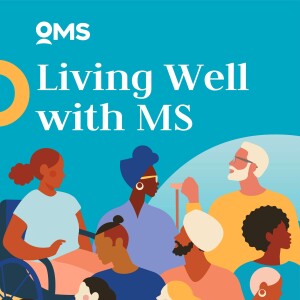
Wednesday Jul 12, 2023
Wednesday Jul 12, 2023
Welcome to Living Well with MS, where we are pleased to welcome Dr Michael Greger as our guest! Dr Greger is a physician, New York Times bestselling author, and internationally recognised speaker on nutrition, food safety, and public health issues. He speaks to Geoff about gluten and MS, how to get enough iron from food and how to ensure you don’t get a leaky gut. Keep reading for the key episode takeaways and Dr Greger’s bio. Make sure you sign up to our newsletter to hear our latest tips and news about living a full and happy life with MS. And if you’re new to Overcoming MS, visit our introductory page to find out more about how we support people with MS. Selected Key Takeaways: Fibre from whole intact grains and legumes will decrease intestinal permeability AKA “Leaky Gut”The most important thing to decrease intestinal permeability or [to] seal up a leaky gut is [to get enough] short-chain fatty acids that our body makes from fibre and resistance starch. These prebiotics that we eat are turned by our good gut bacteria into what are called ‘post-biotics’. What are the most concentrated sources of fibre in the diet? Number one, whole intact grains and legumes including beans, split peas, chickpeas and lentils are the most important sources of fibre. There are many health benefits to eating ground flaxseedsI'd rather people get their flaxseed oil within their flaxseeds, so from ground flaxseed (that's part of my daily dozen). Just because, in addition to getting the short-chain Omega-3 alpha-linolenic acid in those flax seeds that are found in the oil, you also get a nice low soluble fibre [and] most importantly the lignans which are cancer-fighting compounds which are not found in oil. Vitamin C improves the absorption of plant-based iron sources To get enough iron from plant-based sources, you combine sources of iron like legumes and whole grains with Vitamin C-rich foods. Vitamin C actually improves the absorption of plant-based iron. Vitamin C-rich foods [are foods such as] citrus, tropical fruits, broccoli [and] bell peppers. You just want to have it all in your stomach at the same time and that will improve your absorption. Related Links: Visit Dr Michael Greger’s website Find out about Nathan Pritikin (an early pioneer in lifestyle medicine) Listen to S4E53 Ask Jack on the topic of sodium New to Overcoming MS? Visit our introductory page Connect with others following Overcoming MS on the Live well Hub Visit the Overcoming MS website Follow us on social media: Facebook Instagram Twitter YouTube Pinterest Don’t miss out: Subscribe to this podcast and never miss an episode. Listen to our archive of Living Well with MS episodes here. If you like Living Well with MS, please leave a 5-star review. Feel free to share your comments and suggestions for future guests and episode topics by emailing podcast@overcomingms.org. Make sure you sign up to our newsletter to hear our latest tips and news about living a full and happy life with MS. Support us: If you enjoy this podcast and want to support the ongoing work of Overcoming MS, we would really appreciate it if you could leave a donation here. Every donation, however small, helps us to share the podcast with more people on how to live well with MS. Dr Michael Greger’s bio: A founding member and Fellow of the American College of Lifestyle Medicine, Michael Greger, M.D., is a physician and internationally recognised speaker on nutrition. He is a graduate of Cornell University School of Agriculture and Tufts University School of Medicine. Dr Greger’s careerHis science-based nonprofit, NutritionFacts.org, offers a free online portal hosting more than 2,000 videos and articles on myriad health topics. Dr Greger is a sought-after lecturer and has presented at the Conference on World Affairs and the World Bank, testified before Congress, and was invited as an expert witness in Oprah Winfrey’s defence in the infamous “meat defamation” trial. Dr Greger’s booksDr Greger is also an acclaimed author. How Not to Die, The How Not to Die Cookbook, and How Not to Diet became instant New York Times Best Sellers. More than a million copies of How Not to Die have been sold. All proceeds Dr Greger receives from the sales of his books and speaking honoraria are donated directly to charity.
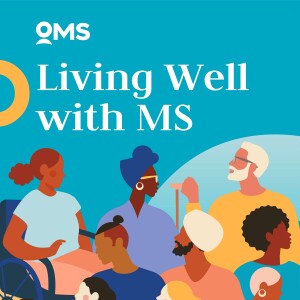
Wednesday Jul 05, 2023
Wednesday Jul 05, 2023
In this episode, we are sharing the highlights from our webinar ‘Living Well with Progressive MS’ with Dr Phil Startin and Professor Helen Reese Leahy. Both Phil and Helen have progressive MS and follow the Overcoming MS Program. They discuss what progressive MS is and how the Overcoming MS Program can benefit people with progressive MS. This webinar was recorded in July 2021 as part of our Finding Hope with Overcoming MS webinar series. You can watch the whole webinar here or the podcast highlights on YouTube here. Keep reading for the key episode takeaways and bio information. Make sure you sign up to our newsletter to hear our latest tips and news about living a full and happy life with MS. And if you’re new to Overcoming MS, visit our introductory page to find out more about how we support people with MS. Selected Key Takeaways Overcoming MS is for every type of MS Helen Rees Leahy: “Overcoming MS is really determined to be an inclusive space in which everybody's experience of MS is acknowledged and honoured. So, though we [people with progressive MS] may be small in number, our voice is growing, and we're very much being heard within the Overcoming MS conversation.” Exercise is still important with progressive MS but be gentle and kind with yourself Phil Startin: “Be kind to yourself, try not to judge [and] compare what you can do now to what you used to be able to do. I've certainly spoken to people who refuse to exercise saying exercising reminds them of what they now can't do and that's really upsetting. We still need goals but hold them more lightly [and] more gently.” Think of the Overcoming MS Program as a toolkit rather than a set of rules Helen Reese Leahy: “I started following the Overcoming MS Program in the 2000s. It's become a framework for my daily life. I've never been eligible for any disease-modifying therapy, so in a sense, Overcoming MS is my health care programme. I feel very empowered by following the Program. I am taking responsibility and managing my own health to the best of my ability. I always regard Overcoming MS not as a book of rules, but as a kind of toolkit and to be honest, I really enjoy following the Program.” More info and helpful links: Watch the original webinar here Try yoga with Overcoming MS facilitator Veronique Gauthier-Simmons here Read more about Progressive MS Join the Progressive MS Circle New to Overcoming MS? Visit our introductory page Visit the Overcoming MS website Follow us on social media: Facebook Instagram Twitter YouTube Pinterest Don’t miss out: Subscribe to this podcast and never miss an episode. Listen to our archive of Living Well with MS episode here. If you like Living Well with MS, please leave a 5-star review. Feel free to share your comments and suggestions for future guests and episode topics by emailing podcast@overcomingms.org. Make sure you sign up to our newsletter to hear our latest tips and news about living a full and happy life with MS. If you enjoy this podcast and want to support the ongoing work of Overcoming MS, you can leave a donation here. Dr. Phil Startin’s bio: Career and Overcoming MS: After a DPhil in Quantum Physics, Phil left his academic roots for a more peripatetic career in management consulting, initially with Price Waterhouse. After years of travelling around the world for both work and pleasure, including a two-year assignment in Geneva, he was diagnosed with Primary Progressive MS (PPMS) in 2007. Phil discovered Overcoming MS in 2011, and coupled with his earlier discovery of mindfulness meditation, it awakened a whole new area in his life. With training and supervision from Bangor University, he now teaches an eight-week mindfulness-based stress reduction (MBSR) course to people with MS and to the general community on a pro-bono basis. He is also a trustee for MS-UK. Personal life: Phil lives in Arrochar, Scotland with his American wife, Cristina, whom he met over a weekend at the Jazz Fest in New Orleans. Phil’s completely convinced that the Overcoming MS Program and mindfulness have positively affected the trajectory of his condition Professor Helen Rees Leahy’s bio: MS and Overcoming MS: Helen was diagnosed with Primary Progressive MS in 1997 when she was 37 years old. Being ineligible for any Disease Modifying Treatment (DMT) within the UK National Health Service, she began to explore holistic approaches to managing her condition. She discovered Overcoming MS in 2008 and has followed the Program ever since. She was previously a Trustee for Overcoming MS. Personal life and career: Helen lives in Conwy, a small, medieval town in North Wales. In 2017, she took medical retirement from the University of Manchester where she was a Professor in the Department of Art History and Cultural Practice. As an Emerita Professor, Helen continues to research and teach doctoral students. She also spends time hand-weaving and learning Welsh, the language of her ancestors.
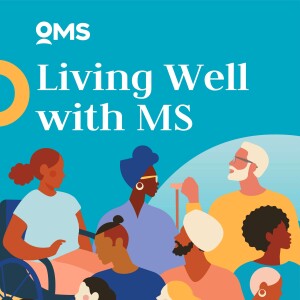
Wednesday Jun 21, 2023
Wednesday Jun 21, 2023
In this episode of Living Well with MS, Dr Jonathan White, Overcoming MS Medical Advisor who is living well with MS, welcomes Dr Jonny Acheson as our guest. Jonny Acheson is a physician who lives with Parkinson’s Disease. They chat about Dr Acheson’s diagnosis, the cross-over between MS and Parkinson’s and the importance of healthy lifestyle to manage symptoms for neurological conditions. Watch this episode on YouTube here. Keep reading for the key episode takeaways, which include great tips and advice for people living with MS and other neurological conditions. Questions and Timestamps: 02:54 Could you start by just giving us an introduction about yourself, your background, your personal background and what you do for a living? 05:48 What was it that initially brought you to that first consultation? 09:41 Was your consultation done any differently because of the fact that you're a doctor? 18:09 Can you explain what Parkinson's disease is? 20:44 Most people with MS are diagnosed between around the ages of 20 and 40. It's maybe slightly later in Parkinson's disease normally, is that right? 21:37 Does everybody with Parkinson's end up taking Levodo? 25:09 I know for you, exercise has become a really important part of how you manage your Parkinson's. Can you tell us about that side of things? 29:59 How has work changed for you since your diagnosis? 33:12 Do you think that Parkinson's has changed the way you are a doctor in any way? 36:06 When and how do you disclose your diagnosis to your patients? 38:52 The cross over between MS and Parkinson’s lifestyle changes. 41:49 Environmental factors linked to chronic conditions. 45:33 The role of stress and how that affects you. Key Takeaways A lifechanging Diagnosis 11:07 “I was totally blindsided. I thought I had Multiple Sclerosis. I thought I had Motor Neuron Disease. I thought I had I had a brain tumor. So, for him [the doctor] to say those words [you have Idiopathic Parkinson’s disease], it was life changing news, but I think he was quite sensible. He said, "take four weeks off." I think he was wise and doing that - I needed time to get my head around it. Now you don't get your head around it in four weeks, but at least you start to educate yourself about it and some things started to make sense.” Taking time off when possible to process and learn about a diagnosis can benefit your wellbeing 16:31 “There are the invisible symptoms that you don't see: the anxiety, the apathy, the problems sleeping. All that stuff is very difficult for people to understand because they don't see it. The four weeks off really helped me, and I think it taught me two things. One, this disease wasn't going to kill me. Well, not directly anyway. And secondly, that high intensity exercise of two and a half hours a week, may slow progression, and it'll certainly help you feel better and reduce your symptoms.” Find an exercise that you enjoy, that is easy and accessible to keep you motivated 27:50 “I think the difficulty is that the general population has difficulty exercising and motivating themselves to exercise. I think if you're living with a long-term neurological condition, it's so important to keep the motivation. That is really quite a challenge. I think it's about finding something that you enjoy doing. It's finding something that you'll stick at, it's something that you know that is easy, and accessible.” More info and helpful links: Read The Imaginary Patient: How Diagnosis Gets us Wrong by Jules Montague Find out more about Every Victory Counts from the David Phinney Foundation Read about Scott, a Parkinson’s patient uses exercise to control his symptoms Find out more about Aerobic exercise for Parkinson’s Find out more about Sport Parkinson’s Jonny Acheson’s art website New to Overcoming MS? visit our introductory page Visit the Overcoming MS website Follow us on social media: Facebook Instagram Twitter YouTube Pinterest Don’t miss out: Subscribe to this podcast and never miss an episode. Listen to our archive of Living Well with MS here. If you like Living Well with MS, please leave a 5-star review. Feel free to share your comments and suggestions for future guests and episode topics by emailing podcast@overcomingms.org. Make sure you sign up to our newsletter to hear our latest tips and news about living a full and happy life with MS. If you enjoy this podcast and want to support the ongoing work of Overcoming MS, you can leave a donation here. Dr Jonny Acheson’s Bio: Jonny’s background Jonny Acheson is an Emergency Medicine Consultant in Leicester who was diagnosed with Parkinson’s in 2016 when he was 41. Originally from Northern Ireland, he moved to England in 2004 to continue his medical training. He uses his art to educate people about Parkinson’s and he has recently taken up the post as Director of Engagement at the Parkinson’s Excellence Network. Advocacy for Parkinson’s He advocates about the importance of exercise in managing Parkinson’s and is presently running a campaign to ensure people in hospital with Parkinson’s get their time critical medication when they need it. Jonny’s personal life He is married to Heather, and they have two children Ben (17) and Anna (12). He enjoys watching Leicester City and playing golf.




